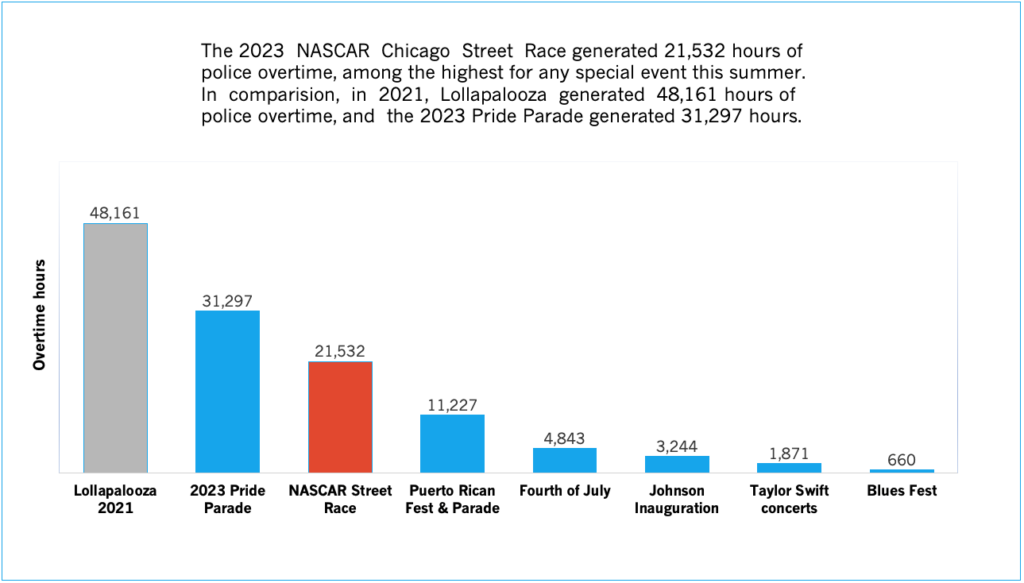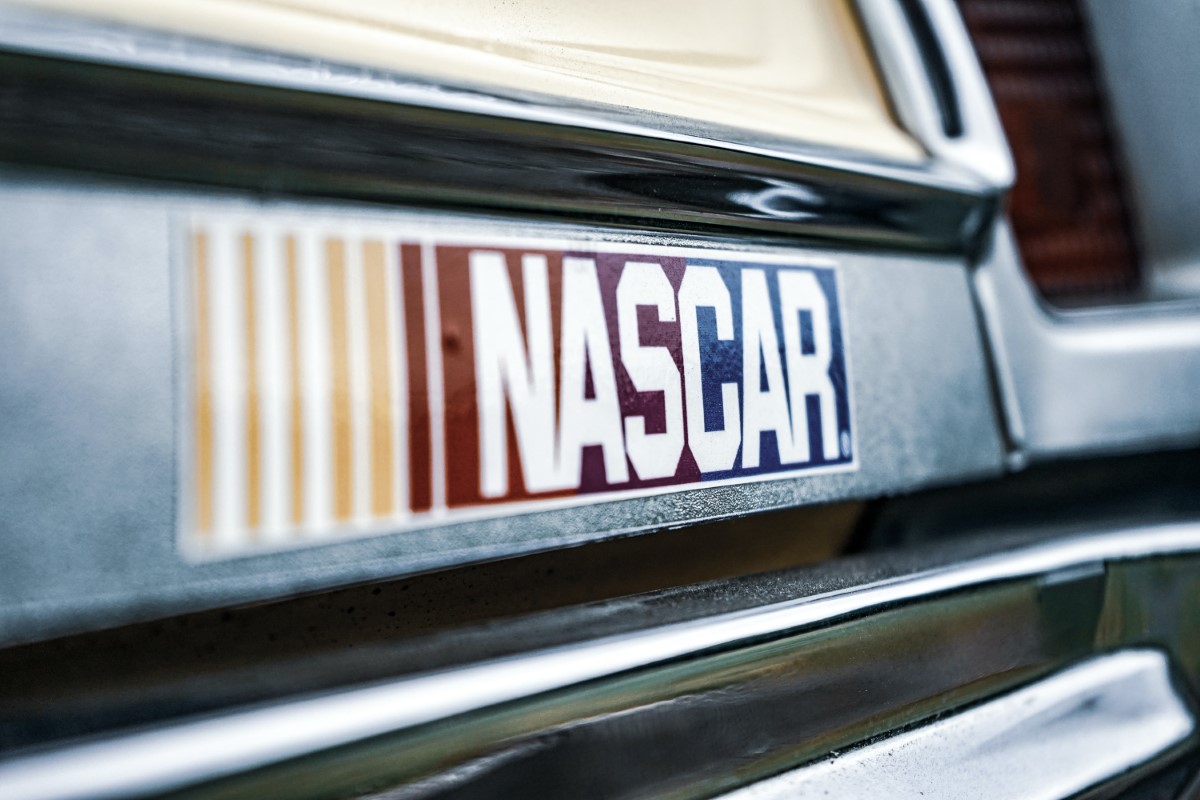The city of Chicago spent at least $3.25 million on the 2023 NASCAR Chicago Street Race, according to a preliminary analysis by the Weekly. That figure includes more than $2.1 million spent on repairs to the streets that made up the racecourse in preparation for it, and an estimated $1.1 million in police overtime associated with the race. The final tally, which could include additional costs such as traffic management, will likely be even higher.
NASCAR’s two days of street races and an accompanying music festival over the July 4 weekend shut down portions of Grant Park and the surrounding streets for weeks as crews prepped the event site. Former mayor Lori Lightfoot landed the deal with NASCAR in 2022 but did not seek City Council approval for it, and some alderpersons blasted that decision. Ald. Brendan Reilly, whose 42nd Ward includes parts of the Loop, called Lightfoot’s secretive deal “ham-handed” and criticized her lack of transparency.
NASCAR’s contract is for three years, but it allows either the City or the car-racing company to cancel it. In the deal Lightfoot’s administration inked, NASCAR was required to pay the Chicago Park District a $500,000 fee in the first year along with fifteen percent of concessions and $2 for each ticket sold in its first year (ticket prices started at $269). The fee is slated to increase to $550,000 in 2024 and $605,000 in 2025.
NASCAR hasn’t yet released information on the number of tickets sold or concession revenue.
The Chicago Street Race’s 2.2-mile track wound around Grant Park on DuSable Lake Shore Drive, Columbus Drive, Michigan Avenue, Jackson Drive, and Balbo Drive. The Weekly submitted a Freedom of Information Act (FOIA) request to the Chicago Department of Transportation (CDOT) for documents showing the cost of repaving and repairing the streets that made up the racetrack in preparation for and following the race.
According to the document CDOT provided, the street work alone cost $2.15 million.
The expenditures were all for work in preparation for the event; no additional roadway repairs were needed as a result of the race, according to CDOT.
Much of that—nearly $1.8 million—was listed as “Engineering” costs related to concrete, pavement, and landscape work on streets and sidewalks along the racetrack before the race. CDOT replaced the curb and sidewalk on the west side of Columbus Drive, resurfaced and repaved roadways, and installed bus pads for the event. The total budget allocated to CDOT’s Engineering division for 2023 is $7.87 million; the NASCAR-related work ate up about twenty-three percent of that division’s annual budget.
NASCAR isn’t on the hook for any of that. The only cost recovery stipulations NASCAR is responsible for are in the Park District permit, which requires NASCAR to pay for any damage to Park District property. Update August 18, 2023: Documents the Weekly obtained today via a FOIA request show the District’s damage assessment totaled $197,714 for landscape restoration and $21,630 for flower replacement.
According to CDOT, there aren’t any race-related repairs needed for the streets or sidewalks that NASCAR might be liable for. The damage assessment to the Park District is still pending.
More than a thousand Chicago cops earned overtime duty related to NASCAR. Data the Weekly obtained from CPD via FOIA showed that 1,034 officers were credited with 21,532 hours of overtime labeled “NASCAR CHICAGO STREET RACE” in the department’s timekeeping system. Nearly half of those hours were worked in the days leading up to the race weekend, and 926 cops were credited with 12,408 hours of overtime labeled NASCAR during the July 4 weekend. Most of those officers were working a canceled day off.
To estimate the cost of NASCAR-related overtime, the Weekly analyzed the CPD data and the salaries of each officer who worked overtime associated with the race. The analysis found that NASCAR generated the equivalent of $1.1 million in overtime for the department.
More overtime was credited to NASCAR than any other special event so far this summer except the Pride Parade, for which officers were credited with 31,297 hours. The 2023 Pride Parade crowd estimate was nearly a million people; NASCAR projected it would attract about 100,000 attendees over the course of the weekend. Update August 10, 2023: Data for Lollapalooza 2023 was not available by press time. In 2021, the most recent year for which the Weekly has data, Lollapalooza generated 48,161 hours of police overtime.

Together, the data the Weekly obtained adds up to an estimated cost of $3,250,000 for street repairs and police overtime for NASCAR. The total price to taxpayers, which could include additional costs such as overtime for traffic control aides, will likely be higher.
A NASCAR-commissioned study predicted the event would generate millions in tax and sales revenue for the City and local businesses. It’s unclear how accurate those numbers were. Choose Chicago, the City’s tourism bureau, has commissioned an economic impact study on the race by researchers at Temple University, Crain’s reported last week.
Mayor Brandon Johnson has been noncommittal about keeping the contract with NASCAR.
“Like everything else I inherited, I’m a teacher, so I will assess it and grade it and it will be an open process where other folks get a chance to weigh in,” Johnson said after the race. “I’m confident that the people of Chicago and our administration will come up with a way forward that’s in the best interest for the entire city.”
Jim Daley is an investigative journalist and senior editor at the Weekly.


It’s likely that the roadwork was needed with or without the race.
Traffic Control was needed for weeks AFTER the Nascar event! Drivers and pedestrians knew to stay away from downtown during NASCAR but after the race, they came back. With Columbus closed for over a week after NASCAR, traffic issues for events (two sold out Dave Matthews Band Concerts at HBV, soccer at Soldier Field, etc ) made the South Loop unbearable. Uber drivers are generally allowed to pick up/drop off on Columbus during events. With Columbus closed off, drivers had no place to do this safely or without impacting traffic. Drivers opted to take out a lane on Roosevelt Road. Gridlock ensued. To be honest, the traffic issues were worse AFTER the race had left Chicago but before streets were reopened.
We need to shut down most of the streets in grant park. New York City did it with Central Park and they haven’t looked back. Stop using our lakefront as a racecourse. With an average of 7 crashes a day on DLSD the expenses from cars near the lake never ends! Give us back our parks and bring us peace.
I’m not a fan of race cars, however, the ambiance was full of energy and it was a great event for the city. I bike all around he race track, all the coments from people were super positive. NASCAR event give to Chicago an upgrade in terms of entertainment and a tourist destination.
The parks belong to the people. What a waste of money, time and effort. Johnson should cancel the contract. An inconvenience beyond belief.